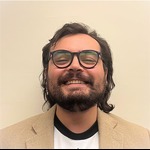Martín Aguilera Valdés
Graduate Student
EDUCATION:
S.T.B. or Sacrae Theologiae Baccalaureus/Licenciatura en Teología, Pontificia Universidad Católica de Chile.
M.T.S. or Master of Theological Studies, Boston College.
RESEARCH INTERESTS:
Decolonial Philosophy, Decolonial Theory, Decolonial Theologies, Liberation Philosophy, Liberation Theologies, Indigenous Scholarship, Political Philosophy, Philosophy of Science, Political Theology, Latin-American Philosophy, Phenomenology, Existentialism, Hermeneutics, Political Economy, Gender Theory, Queer Theory, Philosophy of Religion, and Spirituality Studies. All with a focus on the Global South.
BIOGRAPHICAL STATEMENT
Martín was born in Santiago, Chile, and raised in Puerto Varas (Llanquihue, Futawillimapu). He began his undergraduate studies in Kinesiology in 2016 before transferring to Theology in 2017. This program included a biennium concentration in Philosophy, culminating in a thesis, followed by a triennium course of study in Roman Catholic Theology, completed with a comprehensive oral examination. During his undergraduate studies, Martín contributed to several pedagogical teams as a teaching assistant and served as a research and administrative assistant at both the Centro Teológico Manuel Larraín and the Centro de Estudios de la Religión (Manuel Larraín Theological Center and Center for Religious Studies). He subsequently relocated to the United States to pursue a Master of Theological Studies, where he researched Systemic Violence and Synodality.
His research interests are closely aligned with processes of social change in Chile and globally. He is committed to engaging in politically active and embodied scholarship and research practices that extend beyond traditional academic settings. This includes multiple (pluriversal) approaches to global issues like Mental Health and Climate Change.
Fun fact: Although not part of his current interests, Martins’ first encounter with philosophy was through studying the work of scientists Humberto Maturana and Francisco Varela’s The Tree of Knowledge. The biological roots of Human Understanding (1992), in a summer school at the Universidad de Chile in 2013.
LANGUAGES
Neo-testamentary Greek (intermediate), Ecclesial Latin (elementary), Spanish (native), English (proficiency), French (beginner), Portuguese (beginner).
